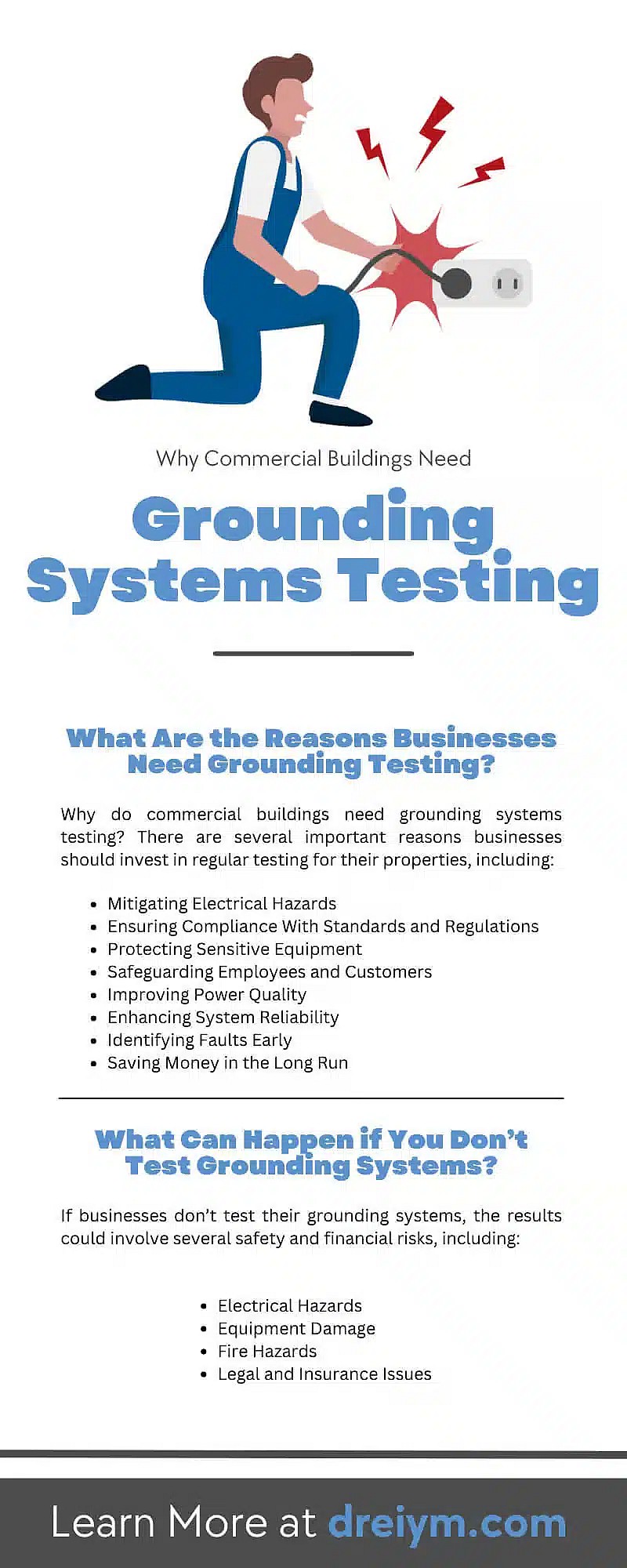Why Commercial Buildings Need Grounding Systems Testing
Ensuring safety and reliability within any business is of the utmost importance. One critical aspect that’s frequently overlooked is grounding testing. Proper grounding is essential for a wide range of industries, including manufacturing, healthcare, data centers, and more. If you’re a business owner, it’s important to understand why your commercial building needs grounding systems testing. Consider these reasons for your business to prioritize this crucial electrical safety measure.
What Is Grounding Systems Testing?
Grounding provides a safe path for electrical current to flow into the earth, preventing electrical shocks and equipment damage.
Grounding systems testing is a vital process that ensures the safety and functionality of grounding systems in commercial buildings. The testing assesses the grounding system’s integrity and identifies any faults or deficiencies within the system.
During grounding systems testing, certified technicians use specialized instruments to measure grounding electrodes’ resistance and assess the overall effectiveness of the system. This analysis helps detect any deterioration, corrosion, or inadequate connections that might compromise the safety of the building’s electrical infrastructure.
What Are the Reasons Businesses Need Grounding Testing?
Why do commercial buildings need grounding systems testing? There are several important reasons businesses should invest in regular testing for their properties, including:
Mitigating Electrical Hazards
Grounding testing helps business owners identify and mitigate potential electrical hazards within their buildings. It ensures electrical systems are properly connected to the ground, preventing the buildup of excessive voltage and reducing the risk of electric shocks or fires.
Ensuring Compliance With Standards and Regulations
Businesses must be in compliance with electrical safety standards and regulations if they want to operate legally. Grounding testing helps businesses meet these requirements, reducing the likelihood of penalties and legal issues.
Protecting Sensitive Equipment
For businesses that heavily rely on electronic devices and machinery, such as data centers or laboratories, grounding testing becomes even more crucial. Proper grounding protects sensitive equipment from voltage surges, preventing damage and costly downtime.
Safeguarding Employees and Customers
Grounding testing helps businesses protect their employees and customers from electrical hazards.
Improving Power Quality
Electrical noise and interference can prevent equipment and machinery from working at peak efficiency, leading to increased energy consumption. Regular grounding testing helps identify and eliminate these issues, improving overall power quality and energy efficiency.
Enhancing System Reliability
Unplanned downtime due to electrical failures can be detrimental to a business’s productivity and reputation. Grounding testing ensures that electrical systems operate reliably, reducing the likelihood of unexpected disruptions.
Identifying Faults Early
Regular grounding testing allows businesses to identify faults in their electrical systems at an early stage. Detecting issues promptly enables timely repairs, preventing potential catastrophic failures and costly repairs in the future.
Saving Money in the Long Run
Investing in grounding testing might seem like an added expense, but in the long run, it’s a cost-effective measure. Testing helps prevent expensive damages and prolongs the life of electrical equipment, ultimately saving businesses money on replacements and repairs.
What Can Happen if You Don’t Test Grounding Systems?
If businesses don’t test their grounding systems, the results could involve several safety and financial risks, including:
Electrical Hazards
If businesses don’t test their grounding systems, they increase the likelihood of electrical hazards like shocks and arc flashes. These hazards can potentially damage equipment and harm employees or customers.
Equipment Damage
Inadequate grounding can cause electrical surges. These electrical surges can result in costly damage to sensitive equipment and machinery within the business.
Fire Hazards
Poorly grounded electrical systems can cause electrical sparks, increasing the risk of fire outbreaks. A fire outbreak can cause considerable damage to a building; it can also result in severe injury or death for anyone trapped inside.
Legal and Insurance Issues
Neglecting grounding systems testing can result in non-compliance with safety regulations, leading to potential legal penalties and insurance coverage disputes in the event of accidents. These legal matters can be extremely time-consuming and costly for businesses.
How Often Do Businesses Need To Test Their Grounding Systems?
Regular grounding systems testing is crucial for maintaining safe and reliable electrical infrastructure in commercial buildings. How frequently a business should test depends on factors such as building size, electrical demand, and environmental conditions. Generally, businesses should stick to these testing schedules:
Initial Testing
Newly constructed commercial buildings or those undergoing significant electrical upgrades need to perform an initial grounding systems test. This ensures that the grounding system complies with industry standards and local electrical codes.
Routine Maintenance
Businesses should schedule routine grounding systems testing for their buildings at least once every one to three years. Regular testing helps identify any issues that may arise over time, such as corrosion or ground resistance increase.
After Significant Electrical Events
Following events like power surges, lightning strikes, or major electrical malfunctions, businesses should promptly conduct grounding systems testing as these events can damage the grounding system. And if a business thinks their grounding system is damaged, they should have it evaluated and repaired immediately.
Building Renovations or Structural Changes
Whenever businesses make significant structural changes or renovations to their buildings, they should carry out grounding systems testing. Changes to a building’s electrical layout can impact the grounding system’s effectiveness, which makes it crucial to verify that the system is still working as intended.
Compliance With Industry Standards
If local electrical codes or industry standards change, businesses should conduct grounding systems testing to ensure compliance with the latest regulations.
Grounding systems testing safeguards commercial buildings from electrical hazards. By understanding what grounding systems testing entails and following the recommended testing schedules, businesses can maintain secure electrical infrastructure and keep their buildings and the people who visit them safe from harm.
Grounding Testing Experts
Whether you’ve just built a new office building, are due for your annual test, or are experiencing concerning electrical issues, Dreiym Engineering can assist with testing. We’re a ground testing company made up of experienced engineers who understand that your business is one of your greatest assets. We take the time to conduct thorough testing to ensure your grounding system is up-to-code and won’t put your building and staff at risk. Contact us today to discuss your electrical grounding needs and schedule your grounding systems testing.













































